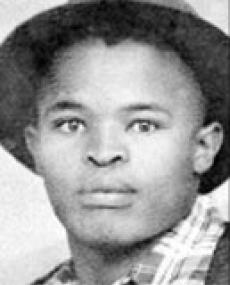
Looksmart Khulile Ngudle was born on 22 May 1922 in KwaZali village, near Alice in the Eastern Cape. His mother, Notyhume, named him Looksmart because when he was born she thought he looked smart. He attended Falconer High, the one-roomed local high school, until Standard Six when he left to work on the mines in Johannesburg.
Ngudle worked as a malaisha, a loader who shoveled gold bearing rock onto cocopans, at the Crown Mines goldmine for two years before returning to his home village to take part in the traditional circumcision ceremony. It was during this time that he met Beauty. In order to earn enough money to ask for her hand in marriage, Ngudle went to Cape Town to look for work.
In Cape Town he moved around from job to job until he had enough money to pay lobola. They married in the local Bantu Presbyterian Church and Ngudle built them a one-roomed house. Together they had six children. In order to support his family Ngudle returned to Cape Town.
Sometime during the 1940s or 1950s Ngudle witnessed bulldozers demolish black-owned homes in Kensington to make way for a White suburb. It was at this time, during the 1950s, that Ngudle, through Archie Sibeko, joined the African National Congress (ANC). Ngudle’s main responsibility was to raise funds when ANC members were jailed or needed a lawyer. To do this he often staged concerts with the choir that he had started in the township where he lived. During this time, to support his family, he sold leftist newspapers such as Fighting Talk and New Age and repaired shoes.
When the ANC was banned in 1960, Ngudle was part of organizing, underground, the Regional Executive Committee in the Western Cape. In 1961, Ngudle joined the ANC’s military wing, Umkhonto we Sizwe (MK), and became an MK commander. After the two bombs made by Dennis Goldberg failed to go off, Goldberg and Ngudle started a training camp in Mamre where they taught MK recruits how to march, read a compass, perform first aid and how to make electrical circuits for bombs.
In May 1963, an order banning Ngudle from participating in political activities was issued and he was confined to the Wynberg Magisterial district in Cape Town. When the security police raided Liliesleaf Farm on 11 July 1963, Ngudle went into hiding. In August 1963, Ngudle assisted in arranging the logistics, transports and safe-houses for 20 ANC comrades who were being sent out of the country for military training. Not far from the Botswana border, the group was arrested and under interrogation one of them broke and gave them the last address at which Ngudle had been staying.
While underground, Ngudle moved around, not staying more than a few days at one address but on this occasion he had fallen gravely ill and was still at the address provided to the security police. On Monday 19 August 1963, Ngudle was arrested under the 90-day detention law. While he was at Caledon Square police station he was badly tortured. Around 23- 24 August 1963 he arrived at Pretoria Central Prison. On 3 September he was allowed into the exercise yard where he saw Govan Mbeki and dropped him a note stating “I am being tortured. My back is full of weals” (Smillie and Ntsoma: 2009).
On 5 September 1963, Ngudle died; he was the first person to die in detention. The Special Branch reported that Ngudle committed suicide and that he had hung himself using his pajama pants. An inquest was called for when a cellmate insisted on reporting details of his treatment in jail. To prevent this, four days after his death, the state banned him, as a banned person cannot be quoted. As a result, Ngudle became the first person to be banned after his death. On 1 March 2007 Ngudle’s body was exhumed by the National Prosecuting Authority’s missing person’s task team led by Madeleine Fullard.